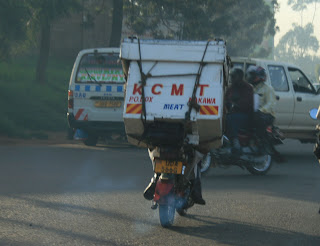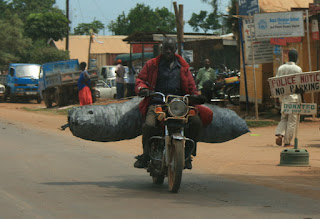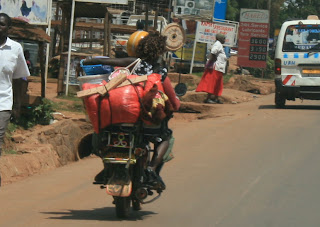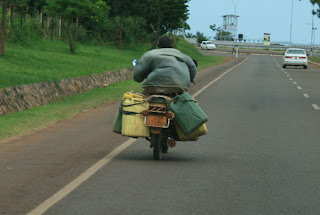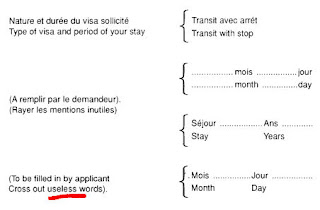One thing I like about travelling is the opportunity to take
pictures. When you travel even a washed out shoe on the beach sometimes make
for a good reminder of where you’ve been. Unfortunately when you travel in
Africa taking pictures can sometimes land you in big trouble. That I have learned
from a previous experience in Cameroon. I don’t know what it is with my African
brothers, but somehow pointing a camera is like an insult to them and you might
literally get a rifle pointing towards you if you are not careful.
Yesterday we were traveling from Kampala to Pakwach, a small
town situated about 400 km north of Uganda’s capital. I am always very cautious
when I take out my camera in African countries; you never know who you might
offend. In Cameroon when a colleague of mine took a picture of a dilapidated
bridge, we ended up emptying our pockets to get her camera back. The police
officer appeared from out of the blue and demanded that we explain ourselves to
the “Police Chief” who was apparently sitting in a little shack further back on
the road where we came from. When we reached the shack there was no Chief in
sight and we eventually had to buy back her camera for 60USD….minus all the pictures
that had to be deleted.
Then it happened….
From out of nowhere a guy in military attire jumped in front
of our vehicle. Agreed, with his camouflage suit he was real hard to spot
against the green lush background, but he appeared from nowhere just like the
guy in Cameroon did. They seem to be masters at this “hide-and-seek” and then
“suddenly appear” game. We knew immediately what was about to happen. He spoke
in Swahili, clearly showing his disapproval. After about ten minutes of
negotiations between himself and our driver, we were allowed to go. Our driver
somehow convinced him that we didn’t have money on us and the opportunistic
road robber wasn’t armed, so we got off easy this time. Phew, close call.
Our next bridge was the one crossing over the Albert
Nile into Pakwach. We crossed the bridge and a police check-point with no
problems…and no pictures this time either. The police officers were quite
friendly and didn’t really ask any questions. Our driver informed us that we
were allowed to take pictures on that bridge, because the last time he crossed
the bridge he had tourist with him and they took pictures…no problem. We
finished our business in Pakwach and decided that on our way back we would take
a picture of the Nile, just for memories’ sake and for my blog of course. As we
approached the bridge, we went for our cameras. Man, it was as if Houdini
himself made his magic appearing-from-nowhere act, this time with an assistant.
From absolutely nowhere TWO military guys appeared next to the vehicle. This
time they were armed, so we were a bit more concerned than the first time. They
spoke in English, told us to exit the vehicle and to follow them to their “Commanding
Officer”. He took the camera from my hands before I could even shout “go!!!” At
first we tried to convince them that we would delete the pictures, but they
didn’t want to budge…it was “Commanding Officer or no camera back.”

We got out, we had no choice. I wasn’t going to leave my
camera there. Unlike the previous time when the “Police Chief” was just a clever
way of getting us out of the car, this time the Commanding Officer was an
actual person in uniform sitting on a tree trunk reading yesterday’s
newspaper. They all spoke in English,
which made it a bit easier for us to communicate too. With my big mouth I told
them that there is no law against taking pictures and that they are just after
our money. This upset them a bit. I could tell by the way they were waving
their AK47’s in the air. My colleague was quite diplomatic and listened to
their long explanation as to “why we should not take pictures without their
permission, blah, blah, blah.” In the meantime he was trying to tell me to shut
up as I was protesting for being harassed on my own continent which was not really strengthening our case. My approach was one of “we are all brothers from Africa who should
respect each other”, while my colleague was using a more sincere apologetic
approach for the “clear misunderstanding”. Obviously he could not play the “We
are all One”-card as he is originally from the UK, a ex-colonialist returning
to a country where his forefathers wasn't welcome in the first place. At least I was
born in Africa, so I had a leg to stand on. I learned however today that the
“we are all one” approach only works when you are bargaining for lower prices
at the craft markets, not when you have an clearly upset rifle-carrying-man in
a camouflage uniform in front of you.
We were told that, even though there are no signposts to
inform the unsuspected tourist that taking pictures of bridges were a crime in
Uganda, you had to ask permission first. This proves to be quite difficult as
you don’t see them before it is too late. I think it makes them feel better if
you give them the recognition as their country’s asset protectors. On the other
side of the bridge there were two more guys sitting, also heavily armed. That
is five people guarding one bridge from tourists’ cameras. I don’t know how
many bridges there are in Uganda, but it clearly creates quite a few jobs, even
if an outdated newspaper is read during working hours. After my colleague’s
apologetic approach their angry faces turned into friendly smiles. We asked
permission to keep the pictures we took and the Commanding Officer nodded his
head. The two soldiers respected their commander’s decision and we were free to
go.
My colleague grabbed his camera and headed straight back to the
car. I asked for a group picture but they rejected my request saying it was not
allowed either. I invited them to visit South Africa…without their rifles of
course….and promised that I would show them around in South Africa without
confiscating their cameras. After all…in Africa “We All Are One”.













